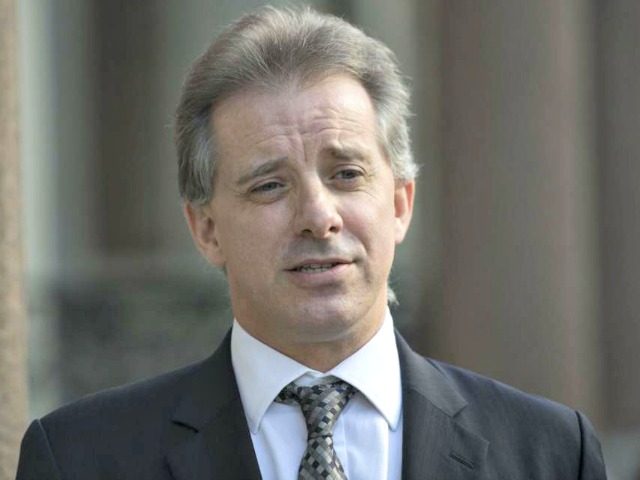Christopher Steele, the author of the infamous anti-Trump dossier, was unable to travel to Russia because the Russian government had reason to suspect he was an MI6 intelligence officer, a book by the co-founders of Fusion GPS relates.
The information raises immediate questions about the credibility of any supposed information on Trump that could be obtained by Steele from alleged Russian sources given that Russia had already suspected his ties to British intelligence.
In their new book, Fusion GPS co-founders Glenn Simpson and Peter Fritsch write that Steele was unconcerned about possible traps from Russian intelligence agencies seeking to ensnare Westerners since Russia suspected as far back as 1999 that Steele worked for MI6.
They wrote:
None of this was of concern to Steele, because he couldn’t go to Russia anymore. In 1999, a disgruntled former MI6 colleague posted on the Internet a list of 116 supposed MI6 agents. Most of the names were indeed spies operating under “light cover” in British embassies overseas, as Steele had in Moscow in the early nineties. Steele’s name was on the list, along with those of Burrows and their mentor and former MI6 chief Sir Richard Dearlove.
Despite Steele’s exposure, the ex-spy told Fusion GPS he could still go about collecting information from Russians related to Trump that ultimately became the dossier.
The book documents:
Steele said he was unable to travel to Russia himself and had even received what appeared to be veiled threats from the Russians via intermediaries. However, he added, the vast Russian diaspora in the West made it possible to build and manage productive networks of sources on the ground in Moscow.
The book by Simpson and Fritsch, Crime in Progress: Inside the Steele Dossier and the Fusion GPS Investigation of Donald Trump, gives an inside accounting of what they say transpired during the course of their anti-Trump work. Their actions tainted Trump’s presidency and eventually lead to a Special Counsel investigation of Trump that found no evidence of collusion between Russia and Trump’s 2016 presidential campaign.
In the book, Simpson and Fritsch admit their firm’s dossier was not a “finished product” and say it was not meant to be released to the public.
Yet that same dossier reportedly served as a roadmap for the FBI’s investigation into unsubstantiated allegations of collusion between Russia and Trump’s campaign. And, according to a Republican House Intelligence Committee memo, the dossier authored by Steele served as part of the basis for FBI warrant requests under James Comey to conduct surveillance on Carter Page, who served as a tangential adviser to Trump’s campaign.
That memo stated: “Neither the initial application in October 2016, nor any of the renewals, disclose or reference the role of the DNC, Clinton campaign, or any party/campaign in funding Steele’s efforts, even though the political origins of the Steele dossier were then known to senior and FBI officials.”
Fusion GPS was paid for its anti-Trump work by Hillary Clinton’s 2016 campaign and the Democratic National Committee via the Perkins Coie law firm.
Aaron Klein is Breitbart’s Jerusalem bureau chief and senior investigative reporter. He is a New York Times bestselling author and hosts the popular weekend talk radio program, “Aaron Klein Investigative Radio.” Follow him on Twitter @AaronKleinShow. Follow him on Facebook.
Joshua Klein contributed research to this story.

COMMENTS
Please let us know if you're having issues with commenting.